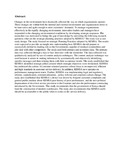| dc.description.abstract | Changes in the environment have drastically affected the way in which organizations operate.
These changes are within both the internal and external environment and organizations strive to be innovative and agile enough to meet customers’ demands. To manage organizations effectively in the rapidly changing environment, innovative leaders and managers have responded to the changing environmental conditions by developing strategic responses. The researcher was motivated to bridge the gap of knowledge by answering the following research question; what are the strategic planning practices adopted by KEMSA? The study was a case study design. The study focused on strategic Planning Practices adopted by KEMSA.
The results were expected to provide an insight into understanding how KEMSA should prepare to successfully defend its leading role as the Governments supplier of medical commodities and also deal with other competitors. The study used both primary and secondary data. The primary data was collected through a face to face interview with the researcher. The data collected was qualitatively analyzed by use of content analysis techniques. The content analysis technique was used because it assists in making inferences by systematically and objectively identifying specific messages and then relating them with their occurrence trends. The study established that KEMSA identified strategic pillars around which strategic objectives were formulated. KEMSA has embraced the culture of customer oriented practices whose focus is on improved, efficient and high standards in customer service delivery.
In addition, KEMSA now operates on performance management tenets. Further, KEMSA was implementing legal and regulatory reforms, capitalization, commercialization, , policy reforms and corporate culture change. The study also established that KEMSA’s choice was driven by frequent customer complaints and general public malaise about KEMSA past history of poor performance, and the new political dispensation of devolved service provision to the Counties and also the performance contracting introduced by the Government. This study recommends that the government of Kenya should fund the construction of modern warehouses. The study also recommends that KEMSA staffs should be accountable to the public when it comes to the service delivery. | en |


